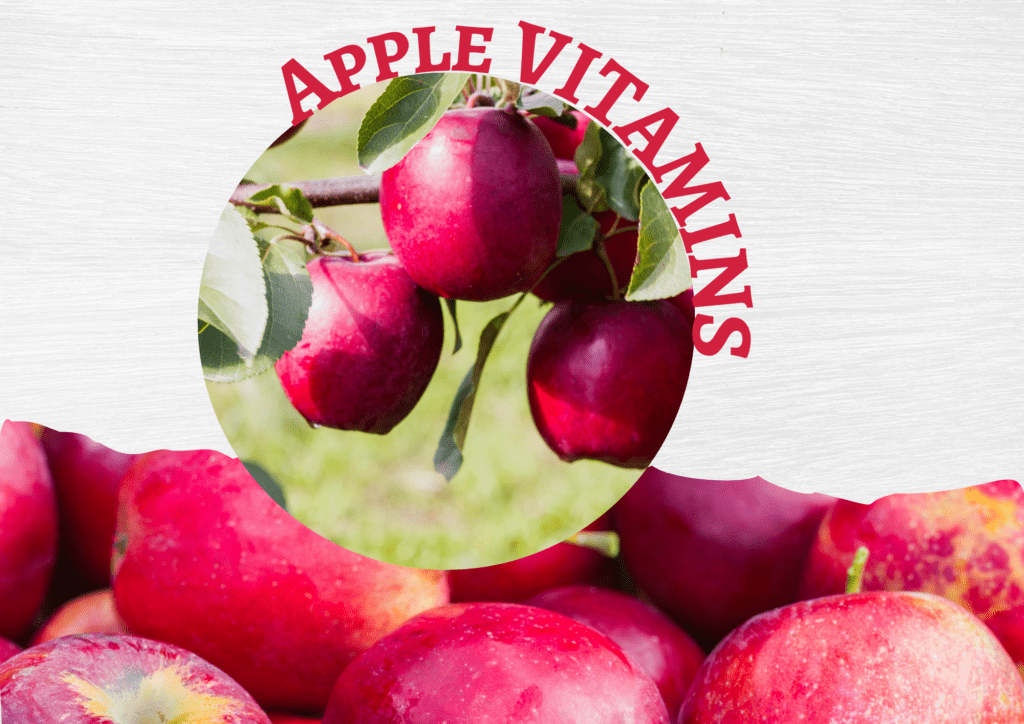Apple Vitamins are found in various way but they are a delicious and versatile fruit, loved for their crisp texture and refreshing taste. However, they’re more than just a tasty snack; apples are packed with essential vitamins that provide significant health benefits. Eating apples daily is often recommended for a reason: their nutrient-rich profile supports immunity, heart health, skin vitality, and much more. In this article, we’ll delve into the key vitamins found in apples, their unique benefits, and why you should consider apples a must-have in your diet.

Key Vitamins Found in Apples
Apples contain a range of vitamins crucial for our health, including Vitamin C, Vitamin A, B-complex vitamins, and Vitamin K. Each of these vitamins has unique properties that benefit our body in multiple ways. Let’s explore each one to see how these nutrients make apples a healthy choice.
Vitamin C: The Immune Booster
One of the standout vitamins in apples is Vitamin C, also known as ascorbic acid. This powerful antioxidant is essential for immune health, protecting the body against infections, and helping to repair tissues. Vitamin C neutralizes harmful free radicals, reducing the risk of chronic diseases and supporting cellular health. Regular intake of Vitamin C can also enhance collagen production, which is vital for skin elasticity and wound healing.
Health Benefits of Vitamin C in Apples:
- Boosts immunity and helps the body fight infections.
- Reduces inflammation and oxidative stress.
- Promotes collagen production for healthier skin and faster healing.
Apples with red or green skin are particularly high in Vitamin C, making them a great fruit to snack on for immune support, especially during cold and flu season.
Vitamin A: Enhancing Vision and Skin Health
Vitamin A, though present in lower amounts in apples, plays an important role in vision and skin health. Beta-carotene, a precursor to Vitamin A, is beneficial for eyesight, particularly for low-light vision. It also aids in maintaining the health and regeneration of skin cells, which helps keep skin looking fresh and youthful.
Key Benefits of Vitamin A in Apples:
- Supports eye health and reduces the risk of night blindness.
- Aids in skin regeneration, helping to prevent dryness and irritation.
- Contributes to the immune system by supporting the health of mucous membranes.
Including apples in your diet can give you a boost of Vitamin A, especially when paired with other fruits and vegetables high in beta-carotene.
B Vitamins in Apples
Apples also contain B-complex vitamins, including B1 (thiamine), B2 (riboflavin), and B6 (pyridoxine). These vitamins play crucial roles in maintaining energy levels and supporting brain health. B vitamins in apples work at the cellular level, ensuring that our body’s systems run smoothly.
Benefits of B Vitamins in Apples:
- Energy Production: B vitamins help convert carbohydrates in apples into energy, which is essential for daily activity and physical endurance.
- Brain Health: B6, in particular, supports brain function and may reduce the risk of cognitive decline.
- Nervous System Support: These vitamins aid in the formation of red blood cells and help maintain a healthy nervous system.
A single apple can provide a good amount of these B vitamins, helping you stay energized and focused throughout the day.
Vitamin K: Aiding Bone and Heart Health
Vitamin K is lesser-known but just as essential for maintaining strong bones and a healthy heart. It plays a vital role in blood clotting, reducing the risk of excessive bleeding. Vitamin K also helps transport calcium in the body, which is crucial for bone health and density.
Health Benefits of Vitamin K in Apples:
- Helps maintain bone density and prevents osteoporosis.
- Supports cardiovascular health by regulating blood clotting.
Regular apple consumption can ensure you get a steady supply of Vitamin K, aiding both bone strength and heart function.
Antioxidants in Apples and Their Benefits
Apples are also rich in antioxidants, including polyphenols and flavonoids, which protect cells from damage caused by free radicals. These compounds help reduce the risk of chronic diseases, slow down aging, and improve skin appearance. Combined with the vitamins in apples, these antioxidants make apples a powerful fruit for overall health.
Types of Antioxidants in Apples:
- Polyphenols: Linked to reducing the risk of heart disease and lowering blood pressure.
- Flavonoids: Help combat oxidative stress, which is associated with aging and disease.
Eating apples daily can provide the body with these antioxidants, adding an extra layer of protection against cell damage and aging.
Minerals in Apples That Complement Vitamins
In addition to vitamins, apples contain essential minerals like potassium, magnesium, and calcium. These minerals work in synergy with vitamins to enhance various bodily functions, from muscle contractions to heart rhythm and bone health.
Benefits of Minerals in Apples:
- Potassium: Helps regulate blood pressure and maintain electrolyte balance.
- Magnesium: Supports muscle and nerve function, as well as bone health.
Apples are thus an all-around health fruit, with both vitamins and minerals that support multiple aspects of well-being.
How Apple Vitamins Contribute to Digestive Health
The vitamins in apples, along with their high fiber content, support a healthy digestive system. Apples are rich in pectin, a type of soluble fiber that aids in digestion and helps maintain a balanced gut microbiome. Vitamin C further promotes gut health by enhancing the absorption of iron and reducing inflammation in the gut lining.
Digestive Benefits of Eating Apples:
- Promotes regular bowel movements and reduces constipation.
- Supports a healthy microbiome with beneficial bacteria.
A daily apple is an easy way to keep your digestive system on track and reduce gastrointestinal discomfort.
Effects of Apple Vitamins on Weight Management
Apples are low in calories and high in fiber, making them an excellent addition to a weight management plan. The vitamins and fiber in apples help create a feeling of fullness, reducing the likelihood of overeating and promoting satiety. Additionally, the natural sugars in apples satisfy sweet cravings, helping to curb the desire for high-calorie snacks.
How Apple Vitamins Aid in Weight Control:
- High Fiber Content: Fiber slows digestion, helping you feel full for longer, which reduces unnecessary snacking.
- Natural Sugars for Sweetness: The natural sugars in apples are healthier than processed sweets, making apples a better choice for weight-conscious individuals.
- Metabolic Boost: B vitamins in apples support metabolic function, ensuring that the body efficiently converts food into energy rather than storing it as fat.
For those looking to manage their weight, eating an apple before meals can help control portion sizes and reduce overall calorie intake, making it easier to reach weight loss or maintenance goals.
Benefits of Apple Vitamins for Heart Health
Apples have long been associated with heart health, thanks to their combination of vitamins, fiber, and antioxidants. The fiber in apples can lower LDL cholesterol levels, often referred to as “bad” cholesterol, which is a significant risk factor for heart disease. Meanwhile, the antioxidants, particularly polyphenols, improve blood circulation and prevent plaque buildup in the arteries.
How Apple Vitamins Support Cardiovascular Health:
- Cholesterol Reduction: Fiber binds to cholesterol in the digestive system, preventing its absorption and lowering overall cholesterol levels.
- Antioxidant Protection: Polyphenols and Vitamin C in apples help reduce oxidative stress, which can damage heart tissue.
- Blood Pressure Regulation: The potassium in apples helps relax blood vessels, which can lower blood pressure.
Including apples in your diet provides a natural way to protect your heart and may even lower the risk of cardiovascular diseases over time.
How Apple Vitamins Boost Skin and Hair Health
The vitamins in apples, especially Vitamin C and A, play a critical role in skin and hair health. Vitamin C supports collagen synthesis, which keeps skin firm and elastic, reducing the appearance of wrinkles and fine lines. It also helps with wound healing and protection from sun damage. Additionally, the B vitamins in apples support hair strength and growth, ensuring hair follicles stay nourished.
Skin and Hair Benefits of Apple Vitamins:
- Youthful Skin: Vitamin C and antioxidants protect against aging and environmental damage, keeping skin looking radiant.
- Hydrated Skin: Apple vitamins and antioxidants prevent dryness and promote even skin tone.
- Stronger Hair: B-complex vitamins in apples strengthen hair strands and prevent breakage.
By regularly eating apples, you’re not only nourishing your body but also enhancing your natural beauty from within, supporting both skin clarity and hair health.
Ways to Maximize the Benefits of Apple Vitamins
To get the most out of apple vitamins, it’s important to choose, store, and consume apples in ways that retain their nutrients. Since vitamins can degrade over time or with improper handling, selecting fresh apples and storing them correctly is key.
Tips to Maximize Nutritional Benefits with Apple Vitamins:
- Choose Fresh, Organic Apples: Organic apples are less likely to contain pesticide residues and may have a higher concentration of nutrients.
- Store Apples in the Refrigerator: Refrigeration can slow vitamin degradation, keeping apples fresher for longer.
- Eat the Peel: Many vitamins and antioxidants are concentrated in the apple peel, so eating apples with the skin can increase your nutrient intake.
- Avoid Over-Cooking: If using apples in recipes, try not to over-cook them, as excessive heat can destroy some vitamins.
Using these tips can help you retain the maximum nutritional value in apples, allowing you to enjoy their full health benefits.
Apple-Based Recipes for Vitamin-Rich Meals
Incorporating apples into your meals doesn’t have to be complicated. From salads to desserts, apples add a delightful crunch and sweetness to a variety of dishes. Here are some easy, vitamin-rich recipes that allow you to enjoy the health benefits of apples without losing their nutritional value.
Easy Apple Vitamins Recipes:
- Apple and Spinach Salad: Mix fresh apple slices with spinach, walnuts, and a drizzle of olive oil and lemon for a refreshing salad rich in Vitamin C and antioxidants.
- Baked Cinnamon Apples: Core apples and bake them with a sprinkle of cinnamon and a touch of honey. This simple dish retains most of the vitamins while adding a cozy warmth perfect for colder days.
- Apple Smoothie: Blend apples with spinach, banana, and a scoop of yogurt for a nutrient-dense smoothie packed with vitamins and minerals.
Adding apples to your daily meals is an easy way to get a healthy dose of vitamins while enjoying the natural sweetness and versatility of this fruit.
Comparing Apple Vitamins with Other Fruits
While apples are a great source of vitamins, they aren’t the only fruit that packs a punch. Many people wonder how apple vitamins stack up against other popular fruits like oranges, bananas, and strawberries.
How Apple Vitamins Compare to Other Fruits:
- Oranges vs. Apples: Oranges are much higher in Vitamin C but lack the fiber content apples offer, making apples better for digestion.
- Bananas vs. Apples: Bananas have more potassium, but apples offer a broader array of vitamins, including Vitamin C and K, and a variety of antioxidants.
- Strawberries vs. Apples: Strawberries also provide Vitamin C and antioxidants but lack the same levels of fiber as apples.
Each fruit has unique benefits, but apples stand out for their balance of fiber, vitamins, and antioxidants, making them one of the most versatile and health-supporting options available.
| Nutrient | Amount per 100g | Primary Health Benefits | Additional Notes |
|---|---|---|---|
| Vitamin C | 4.6 mg | Boosts immune system, antioxidant, promotes collagen production | Helps repair tissues and reduces oxidative stress |
| Vitamin A | 54 IU | Supports eye health, skin regeneration | Important for vision, especially low-light vision |
| Vitamin K | 2.2 mcg | Aids in bone health, supports heart health | Essential for blood clotting |
| Vitamin B1 (Thiamine) | 0.017 mg | Helps convert food into energy, supports brain health | Supports nervous system |
| Vitamin B2 (Riboflavin) | 0.026 mg | Energy production, promotes skin health | Essential for red blood cell production |
| Vitamin B6 | 0.041 mg | Supports brain function, boosts mood | Important for cognitive development |
| Fiber | 2.4 g | Aids digestion, promotes satiety | Helps with weight management and gut health |
| Potassium | 107 mg | Regulates blood pressure, supports muscle function | Balances electrolytes in the body |
| Polyphenols | Varies | Antioxidant, reduces inflammation, heart health | Includes flavonoids and other beneficial compounds |
| Pectin | Varies | Improves digestion, lowers cholesterol | Type of soluble fiber specific to apples |
Conclusion: Why Apples Are a Nutritional Powerhouse
Apples are more than just a classic fruit; they’re a nutrient-dense powerhouse packed with vitamins, fiber, and antioxidants. From Vitamin C that boosts immunity to Vitamin A for vision health, and B vitamins for energy, apples support nearly every bodily function. Combined with the natural antioxidants that fight aging and reduce disease risk, apples offer an impressive range of benefits that can enhance health and wellness at any age.
Including apples in your daily diet is a simple and delicious way to ensure you get essential vitamins. Whether you’re aiming for better digestion, heart health, skin vitality, or just want a nutritious snack, apples are a fantastic choice. Embrace the goodness of apples and make this humble fruit a staple in your healthy eating routine.
FAQs
1. How many vitamins are in an apple?
An apple contains several key vitamins, including Vitamin C, Vitamin A, B-complex vitamins, and Vitamin K, along with various antioxidants that support overall health.
2. Is it better to eat an apple with the skin on?
Yes, eating an apple with the skin on maximizes vitamin intake, as the peel contains a significant amount of antioxidants and other nutrients.
3. Can apple vitamins help with weight loss?
Yes, the vitamins and fiber in apples help with weight management by promoting satiety, reducing calorie intake, and supporting metabolism.
4. How many apples should I eat daily for optimal health?
Eating one apple per day is a great way to enjoy the health benefits, but you can adjust this depending on your dietary needs and preferences.
5. Are apples good for heart health?
Absolutely! The fiber, antioxidants, and vitamins in apples work together to reduce cholesterol, lower blood pressure, and improve cardiovascular health.










